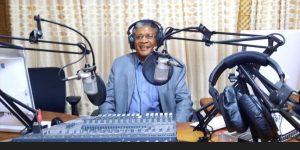MCT urges radio stations to prioritize developmental issues, avoid gossip

The Chairperson of the Ethics Committee (EC) of the Media Council of Tanzania (MCT), Judge Robert Makaramba, at one of MCT’s member radio stations after discussions on the importance of adhering to journalistic ethics.
February 13, 2025: The Media Council of Tanzania (MCT) has urged radio stations to focus on their core responsibilities of informing, entertaining, and educating the public instead of being gossip platforms.
The MCT Executive Secretary, Ernest Sungura, made these remarks in his statement issued as part of the celebration of World Radio Day, which is observed annually on February 13.
“Radio stations should stop being platforms for discussing personal and meaningless matters. Instead, they should focus on delivering public interest content and well-researched programs that highlight and address societal issues,” he stated.
Furthermore, MCT has instructed radio presenters to adhere to broadcasting ethics and ensure the proper use of the Kiswahili language so that the information shared with the public is clear and understandable to all age groups.
He also condemned the practice by some radio station owners of hiring presenters based on their popularity rather than their professionalism in journalism and broadcasting, this act contributes to compromise the standards of journalism ethics on radio.
The Executive Secretary emphasized the importance of radio in broadcasting community-related content such as education, health, development, politics, gender inclusivity, and security issues.
This year’s theme for the celebration is “Radio for Climate Action,” aiming to encourage discussions on radio that educate, promote sustainable change, and engage communities in conversations about climate change.
Recognizing the power of radio, MCT has called on radio stations to develop content that educates citizens about the upcoming election process, scheduled for October this year, so that the public can follow debates and make informed decisions when voting.
Statistics show that despite advancements in communication technology, radio remains the most trusted medium for disseminating information to the public. According to data from the Ministry of Information, Culture, Arts, and Sports (MICAS), as of 2024, Tanzania had a total of 247 radio stations. Ends.
